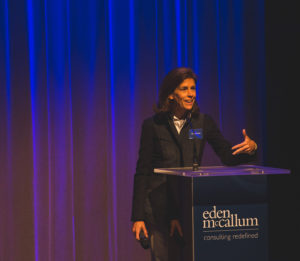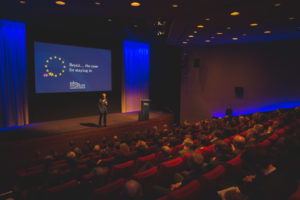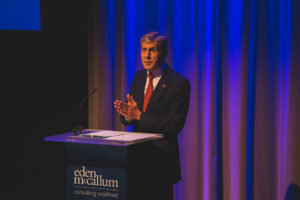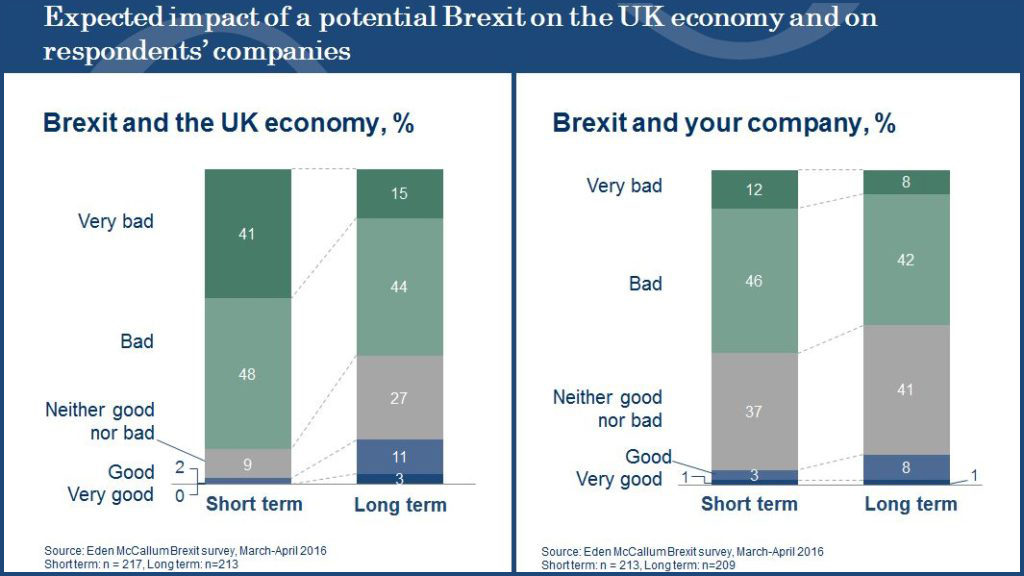Breakfast audience with Lord Rose… the risks of Brexit
Eden McCallum hosted a breakfast audience with Lord Rose, chairman of Britain Stronger in Europe, which is the officially designated campaign organisation recommending that Britons vote to “Remain” in the European Union on the 23rd June this year.
Addressing a combined audience of consultants, clients and friends of Eden McCallum with less than 60 days to go until the vote, Lord Rose urged business voices to speak up in favour of Britain remaining in the EU – he described himself as “personally disappointed” at the desire of so many employers to keep a low profile as the referendum approaches.
“There is no second chance,” he warned. “I urge you to communicate the results of risk assessments and share that with your shareholders and employees.”
Only a high turnout and a strong mandate for “Remain” would settle the issue properly, Lord Rose said. That would be his definition of success.
Quoting the Financial Reporting Council, he said it was the duty of companies to be open about how they envisaged the uncertainty of a British exit from the EU would impact on business, and on employment.
 Opening the event, Dena McCallum shared the Eden McCallum view that being inside the EU was of benefit to the UK, and core to the firm’s consultancy business – nearly half of Eden McCallum’s UK-based projects have team members who are non-UK EU nationals, and nearly a quarter of projects based on the continent have UK nationals on the teams.
Opening the event, Dena McCallum shared the Eden McCallum view that being inside the EU was of benefit to the UK, and core to the firm’s consultancy business – nearly half of Eden McCallum’s UK-based projects have team members who are non-UK EU nationals, and nearly a quarter of projects based on the continent have UK nationals on the teams.
Furthermore, in a survey of 200 senior businesspeople contacted by Eden McCallum, nine out of 10 thought Brexit would have a negative impact on the economy in the short term, and six out of 10 in the long term. On a similar question about the impact on their own business, six out of 10 thought Brexit would have a negative impact in the short term, and half in the long term.
This negative impact was enlarged on by Lord Rose, with a plea to the “Leave” campaign to provide better comparisons of what the business environment might look like outside the EU – for the sake of healthy debate and a properly informed electorate.
Responding to accusations that the “Remain” campaign was relying on scare stories, Lord Rose said it was “not about Project Fear. It should be about Project Reality.”
Difficult as it was to predict exact outcomes – “because no one has ever left the EU before” – there would unequivocally be an economic downside.
Trade and prosperity
When it came to the “Leave” campaign’s arguments, he highlighted the “vague” options for other trading relationships put forward so far, claiming there was as yet no clearly articulated alternative, and no option as advantageous as continued membership in terms of freedom from tariffs.
“We say to Vote Leave: you must give us a granular view of what out would look like.”
He went on to admit that Europe was “not perfect”, but that Brexit, in the current global economic climate, was a clear risk: “The economic recovery is fragile, there are headwinds.”
Under questioning from the audience, Lord Rose defended David Cameron’s renegotiation of Britain’s membership terms, hailing “meaningful wins” that would be legally binding. A continued push for reform in Europe would be the best way to make the most of EU membership in the future, he said, expressing a hope that Britain would “fully engage and send our best people.”
He promised a ramping up of the ‘Remain’ campaign to address different segments of the population, including women and voters under the age of 30, after the May local and national elections were out of the way.
“I think many people will make up their mind when they are ready – we need to make sure they get all the information.”
Fighting the “Leave” arguments
 The invited audience pressed Lord Rose on some of the “Leave” campaign most common accusations: his response was firm. EU membership is not an elite preoccupation, it matters to “the man on the Clapham omnibus” who will lose income if Britain leaves. Promises of absolute sovereignty outside the EU are illusory, because “you can’t come to any deal without ceding some sovereignty.” And Britain had “a fantastic future in Europe”, where Britons seem to underestimate their considerable influence.
The invited audience pressed Lord Rose on some of the “Leave” campaign most common accusations: his response was firm. EU membership is not an elite preoccupation, it matters to “the man on the Clapham omnibus” who will lose income if Britain leaves. Promises of absolute sovereignty outside the EU are illusory, because “you can’t come to any deal without ceding some sovereignty.” And Britain had “a fantastic future in Europe”, where Britons seem to underestimate their considerable influence.
“We must look out of the front windscreen not the rear view mirror.”
On immigration, probably the strongest weapon in the “Leave” campaign’s fight for a vote against EU membership, he defending the role of immigrants in the UK economy: “We need these people here.” He made a clear distinction between that issue and the migration crisis, which is “one of the existential crises of our time and it won’t go away if we leave the EU.”
A personal reflection
 Lord Rose, a household name because of his leadership role at Marks & Spencer and one of the UK’s most prominent business names, said his motivation in leading the “Remain” campaign was concern for prosperity.
Lord Rose, a household name because of his leadership role at Marks & Spencer and one of the UK’s most prominent business names, said his motivation in leading the “Remain” campaign was concern for prosperity.
“I worry about the careers of all the ordinary people in this country.”
Echoing Dena McCallum’s earlier warning that “complacency is a real risk” for supporters of Britain remaining in the EU, Lord Rose told the audience that the referendum was the most important decision the country had faced for the last half century.
“It is vital,” he warned, “to understand the consequences.”
“This is an important debate, so please go and talk to your people and make sure that they get out there on voting day on June 23rd.”
ENDS


